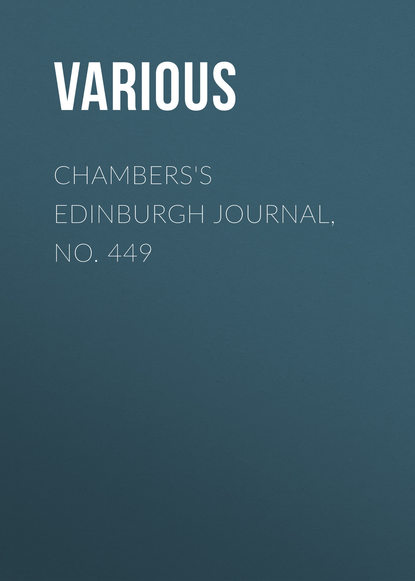По всем вопросам обращайтесь на: info@litportal.ru
(©) 2003-2024.
✖
Chambers's Edinburgh Journal, No. 449
Автор
Год написания книги
2019
Настройки чтения
Размер шрифта
Высота строк
Поля
She comes! the fair Corinna comes! 'mid thunders of acclaim,
That rush unto the lips of all at the murmur of her name.
Scatter sweet roses all around; fling perfumes to the air;
And strew her path with all that breathes of beautiful and fair.
Her car hath gained the Capitol—her foot is on the stair;
She stands a form of matchless grace, the queen of thousands there.
Bring forth the wreath that threw afresh a lustre round his name,
Whose genius burned, a vestal fire, with never-dying flame.
Whose vision pierced the mantling mists that circle round the tomb,
Where bitter groans resound for aye amid the starless gloom;
Who saw the cities of the blest, and with as fearless tread
Paced through the ebon halls of hell, the mansions of the dead.
The crown that might have cast a ray to light lone Tasso's gloom,
But only drooped, a funeral wreath, to wither on his tomb;
Ay, reach it down, that laurel crown, it never hath been given
To one more rich in beauty's grace, and all the gifts of Heaven.
Oh, it is grand, a nation's love! a people's benison,
The homage of ten thousand hearts flung at the feet of one;
The rapturous glow that fires the soul, and thrills through every frame,
At the mention of the worshipped one, the echo of her name.
Corinna at the Capitol! Oh, what a spell comes o'er me,
As I view the gorgeous pageantry that passeth now before me;
But I would I knew the meaning of the tears which like a stream
In pearly drops are shining through the rapture of her dream.
Though laurel wreaths surround her brow, and glory lights her name,
There is a chamber in her heart can ne'er be filled by fame;
Lonely, amid adoring crowds, she deems, as well she may,
The faithful love of one true heart were better worth than they.
And when the crowd is parted, and the festival is o'er,
The many voices silent, and the music heard no more;
She will think upon the triumph, the splendour that is gone,
As the shadow of a dream, or the echo of a tone!
GOING AHEAD
The reading of your paper on 'Railway Communication,' has given me great pleasure: your remarks about American railways are very well in the main, but the speed of travel is misstated, as it ranges from forty to fifty miles an hour; unless it be an omnibus railway, like the Haarlem, where they stop for passengers every few hundred yards. The Hudson River Railway, which passes by our mill at Yonkers, almost frightens my brother out of his wits by its speed, and he takes the steam-boat now to avoid it. The trains go very fast, but it is a superb road, and very safe, as the servants of the company, with their flags and lanterns, line the road the whole distance. They have twenty trains a day. The Erie Railway is also finished from New York to Lake Erie; the traffic on this line is immense, freight often lying two weeks before it can be put through. Its income is over three and a half million dollars. We have only one class of passengers, except emigrant trains: the fare generally ranges from a cent and a quarter to two cents a mile—on some of the shorter roads, as high as three or four cents. All the carriages are lined with mahogany and silk plush. The locomotives on our long roads weigh from twenty to forty tons. The fact is, that anything said about our physical development on data collected at any one period, is quite likely to be false or absurd within a twelvemonth. Though in the midst of it, and not one of the excitable kind, I am often astonished at it myself. I have several times mentioned that you would hardly know New York, or find any of your old landmarks; and yet New York would be comparatively a mean city, if you took away what had been built within a year. Steam-ships shew another phase of it: three years ago, we hardly had the shadow of one; now—and I have looked into the matter very carefully—I would not, as a commercial speculation merely, exchange forty of the best of our steam-ships for any other forty in the world: of course I don't refer to war-steamers. Some of the California steam-ships are perfect pictures in model, and put the Collins' Line into the shade. By the way, did you ever notice their passenger-list?—from 300 to 600 at a trip; and one vessel last year took 1125 passengers, paying very nearly half her cost in a single trip. In the summer, they slept about the decks like ants in a hill. A good education, including a college one to those who have the proper capacity, is open to every poor child in this city, free of cost. The immense sums necessary to pay for all this, are voted by the people themselves out of their own pocket.—Private Letter from New York.
notes
1
This is in substance a tradition still current among those Eastern Christians who are 'dwellers in Mesopotamia.'
2
Nos. 388 and 416.
3
The facts here adduced are from a recent contribution of Dr J. W. Hudson to the Manchester Examiner.











